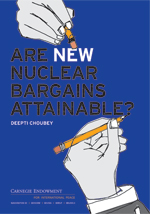If the United States and other countries with nuclear weapons take action toward further disarmament, they hope that countries without them will support additional efforts to prevent the further spread and use of nuclear weapons.
But non-nuclear-weapon states take a different view. Citing the unfulfilled promises of nuclear-weapon states, they declare such a bargain to be unfair and a misreading of the political landscape.
A better understanding of the views of non-weapon states would provide the next U.S. administration with a serious opportunity to lead the rebuilding of a dangerously damaged nonproliferation regime, explains Deepti Choubey in a new report.
Drawing upon extensive interviews with foreign ministry officials from sixteen non-nuclear-weapon states – including U.S. allies (within and outside of NATO), key leaders of the global south, and members of the Non-Aligned Movement (NAM) – Choubey assesses the level of eroding confidence that non-nuclear-weapon states have about how seriously nuclear-weapon states take their disarmament obligations.
She provides a "reality" check on the environment in which U.S. officials seek to advance their nonproliferation agenda, offers a step-by-step approach to engage states without weapons, and explains what non-nuclear-weapon states want and how they can maximize their own agenda by responding to positive signals from the United States.
Key recommendations:
The next U.S. administration should:
- Acknowledge and reconfirm previous disarmament commitments.
- Unambiguously deemphasize the role of nuclear weapons in U.S. national security policy in the next U.S. National Security Strategy document and Nuclear Posture Review.
- Reengage aspects of the disarmament machinery while setting a timeline for action and setting expectations about the roles and responsibilities of all states.
- Negotiate a fissile material cutoff treaty and ratify the Comprehensive Test Ban Treaty (CTBT).
- Update NATO's nuclear doctrine for today’s threats.
- Appoint a team of high-level officials, who can listen to the concerns of non-nuclear-weapon states and reorient U.S. policy in ahead of the 2010 Nuclear Non-Proliferation Treaty (NPT) Review Conference.
Non-nuclear-weapon states should:
- Acknowledge the difficulties that fully disarming global arsenals will entail.
- Demand more disarmament from nuclear-armed states other than the United States.
- Make progress first in areas of common ground between nuclear and non-nuclear-weapon states.
- Resolve internal policy inconsistencies – particularly the disagreement among NATO members on the utility of its nuclear umbrella.
- Allies protected by the U.S. nuclear umbrella should weigh in on U.S. nuclear posture debates and articulate their comfort with the size of the U.S. nuclear arsenal.
Choubey concludes:
“On both the nonproliferation and disarmament of nuclear weapons, America’s leadership and authority have eroded so far that they have imperiled U.S. national security. There is a way forward, if American policy makers recognize that disarmament is not altruism. Instead, disarmament is vital to U.S. security. Many countries must take corrective action to improve the nonproliferation regime, but the United States has the best capacity to do so. With the alignment of a new U.S. administration, the sheer impact U.S. action can have on the international regime, and the impending 2010 Non-Proliferation Treaty Review Conference, the United States has a serious opportunity to reclaim its leadership.”
A limited number of print copies are available.
Request a copy
About the Author
Deepti Choubey is the deputy director of the Nonproliferation Program. Her research interests include the calculations of non-nuclear-weapon states, the intersection of nuclear nonproliferation and climate-change agendas, and the role of nonproliferation for long-term U.S. foreign policy. Prior to joining the Carnegie Endowment in 2006, Choubey was director of the Peace and Security Initiative (PSI) for the Ploughshares Fund.

.jpg)



